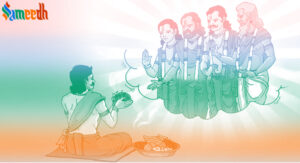In Hinduism, Pitrilok refers to the realm or world of the ancestors, where departed souls reside after death. It is one of the realms in the cycle of rebirths (samsar) and is considered a transitional stage between earthly life and higher spiritual realms or liberation (moksh).

In Hindu cosmology and belief systems, Pitri Loka, also known as Pitri Lok or Pitriloka, is considered a subtle realm or dimension where the souls of deceased ancestors reside after death. Pitri Loka is believed to be situated in the realms beyond the physical universe, in a space that is not directly perceivable by ordinary human senses.
While there isn’t a specific geographical location attributed to Pitri Loka in the physical sense, it is often described in mythological and religious texts as existing in an intermediary realm between the earthly plane (Bhuloka) and higher spiritual realms. Pitri Loka is considered a transitional stage where souls undergo purification, experience the consequences of their actions (karm), and await rebirth or progress to higher states of existence. It is believed that a world exists between the Earth and heaven called Pitrilok. Here, ancestors of three generations reside. It is considered a temporary abode where souls experience the consequences of their past actions (karm) and undergo purification before moving on to higher states of existence.
Souls in Pitrilok continue to undergo spiritual evolution and purification, working through their unresolved desires, attachments, and karmic debts from previous lives. The performance of rituals and offerings by their living descendants, such as Shradh ceremonies and offerings of food and prayers, is believed to help alleviate the suffering of the ancestors and facilitate their progress in the afterlife.
The duration of a soul’s stay in Pitrilok varies based on its karma and spiritual advancement. Souls may spend varying lengths of time in Pitrilok, depending on the need for purification and the fulfillment of their karmic obligations.
Hindu rituals and practices such as Shradh ceremonies, Tarpana (offering of water), and offering prayers and offerings to ancestors play a crucial role in honoring and supporting the souls in Pitrilok. These rituals are believed to provide nourishment and comfort to the ancestors, helping them progress on their spiritual journey and attain liberation.
Souls in Pitrilok eventually move on to higher realms of existence or attain liberation (moksha) once they have purified their karma and resolved their attachments and desires. The performance of meritorious deeds, spiritual practices, and the grace of divine beings can accelerate the soul’s journey towards liberation from the cycle of birth and death.
Pitrilok underscores the importance of honoring and remembering one’s ancestors in Hindu culture and highlights the interconnectedness between the living and the departed souls. By performing rituals and offerings dedicated to ancestors, Hindus seek to express gratitude, seek blessings, and support the spiritual well-being and progress of their departed loved ones in the afterlife.